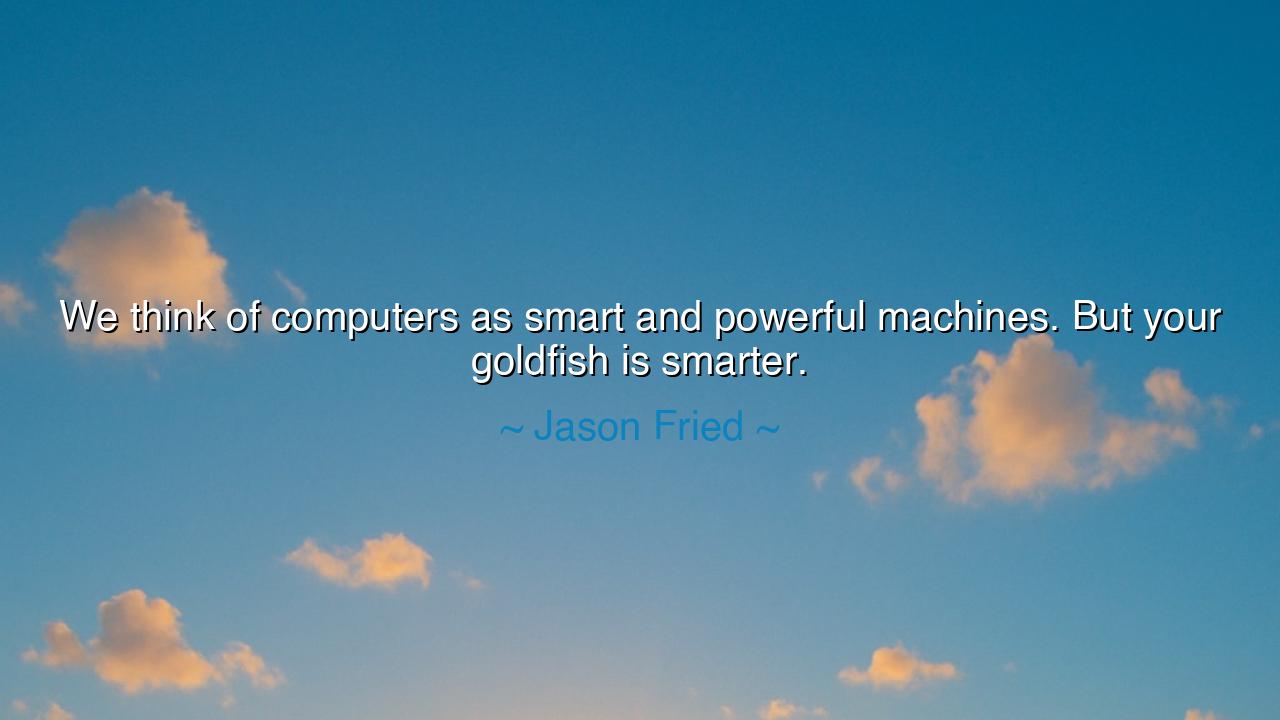
We think of computers as smart and powerful machines. But your






In the deceptively simple yet profoundly reflective words of Jason Fried, we are given a riddle of the modern age: “We think of computers as smart and powerful machines. But your goldfish is smarter.” At first, this saying may stir laughter, for how could a small creature that drifts lazily through the water be wiser than the gleaming machines that calculate the orbits of stars and translate the tongues of nations? Yet behind the humor lies an ancient truth, one that speaks not of intelligence in the mechanical sense, but of awareness — the sacred gift of life itself. Fried’s words are not an insult to technology, but a reminder to humanity: that life, in its smallest form, still surpasses the greatest of our creations, for it breathes, perceives, and feels.
In the age of the ancients, wisdom was not measured in knowledge alone, but in consciousness — the ability to be aware of one’s existence and place in the world. The philosophers of Greece spoke of psyche, the soul that animates all living things, and the sages of the East taught that all beings, from the mightiest eagle to the humblest insect, hold within them the divine spark of awareness. The goldfish, though small and silent, possesses this spark: it can hunger, it can learn, it can seek safety and recognize its keeper. A computer, for all its speed and precision, knows nothing of desire, fear, or love. It moves, but it does not live. It calculates, but it does not understand. Thus, Jason Fried speaks the truth of the ancients — that no machine, no matter how powerful, can replace the mystery of the living mind.
The origin of this quote lies in Fried’s deep reflection on technology and human behavior. As the founder of Basecamp and a thinker in the digital age, he has long observed how people, surrounded by “smart” devices, have begun to confuse processing with thinking, and data with wisdom. We stand in awe of machines that can perform a thousand tasks in a second, forgetting that they do so without awareness. The goldfish, though it remembers for mere moments, still feels the water’s current, sees the shimmer of light, and knows hunger and rest. In that simplicity, it possesses a wisdom deeper than all computation — the wisdom of being alive.
History, too, offers us lessons of this kind. When the first mechanical automata were built in the courts of the medieval world — lifelike birds that could sing, or statues that moved — kings and scholars marveled at their lifelike precision. Yet even then, the wise among them understood that the imitation of life is not life itself. The great Leonardo da Vinci, who designed wondrous machines, also wrote that the bird, in its freedom and instinct, knows truths that no engineer can design. It is one thing to simulate motion; it is another to feel it. Fried’s goldfish is a continuation of this ancient parable — a humble reminder that creation without consciousness is but a shadow of life.
There is also in Fried’s words a critique of our modern worship of machines. We bow before our computers, entrust them with our memory, our communication, our very thoughts — and in doing so, we risk forgetting what true intelligence means. The goldfish, in all its simplicity, needs no electricity, no algorithms, no servers humming in the dark. It lives in the eternal now. It reacts to the world as it is, not as it is simulated. To call it “smarter” than a computer is to reclaim the meaning of wisdom — that awareness, presence, and feeling are higher forms of knowledge than calculation alone.
The lesson, then, is this: do not mistake power for wisdom, nor speed for understanding. The machines we build may one day surpass our intellect, but they will never surpass the spark of being that dwells within even the smallest creature. The goldfish teaches us that simplicity, presence, and instinct are sacred virtues in a world obsessed with complexity. Be like the goldfish — aware of the light upon the water, content in the moment, free from the illusion that thought alone defines existence.
And so, let this truth be passed down: a machine may store every book ever written, but it cannot dream. It may calculate every star, but it cannot wonder. It may mimic a voice, but it cannot sing. The goldfish, though small, embodies what no machine can: the essence of life itself. As Jason Fried reminds us, our creations, however magnificent, are not our masters. The truest intelligence still resides in that which breathes, feels, and knows that it is alive. Therefore, cherish your awareness, your being, your fragile and precious mind — for in that awareness lies the one thing that no machine will ever possess: the soul.






AAdministratorAdministrator
Welcome, honored guests. Please leave a comment, we will respond soon